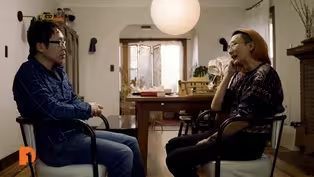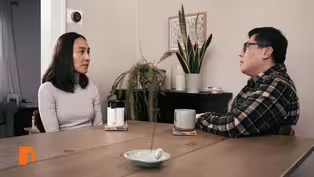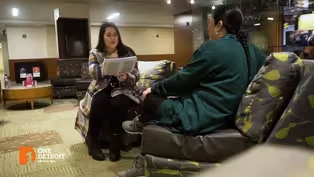
Dan Moen on growing up as a Filipino adoptee in Romeo
Clip: Season 8 Episode 46 | 4m 11sVideo has Closed Captions
Dan Moen, an adoptee from the Philippines, shares his experience growing up in Romeo.
Dan Moen, an adoptee from the Philippines, grew up in a loving metro Detroit family with a close-knit group of friends, but something always felt off. With his partner Joe Hunter’s love and support, Dan kept looking for his biological family even when the search seemed futile. Here, he talks about his experiences growing up as a Filipino in the Romeo area.
Problems playing video? | Closed Captioning Feedback
Problems playing video? | Closed Captioning Feedback
One Detroit is a local public television program presented by Detroit PBS

Dan Moen on growing up as a Filipino adoptee in Romeo
Clip: Season 8 Episode 46 | 4m 11sVideo has Closed Captions
Dan Moen, an adoptee from the Philippines, grew up in a loving metro Detroit family with a close-knit group of friends, but something always felt off. With his partner Joe Hunter’s love and support, Dan kept looking for his biological family even when the search seemed futile. Here, he talks about his experiences growing up as a Filipino in the Romeo area.
Problems playing video? | Closed Captioning Feedback
How to Watch One Detroit
One Detroit is available to stream on pbs.org and the free PBS App, available on iPhone, Apple TV, Android TV, Android smartphones, Amazon Fire TV, Amazon Fire Tablet, Roku, Samsung Smart TV, and Vizio.
Providing Support for PBS.org
Learn Moreabout PBS online sponsorship(serene music) - Diversity and culture is always what has driven you, sir, Mr. Moen, who comes from 23 Mile and Van Dyke in the probably one of the more Caucasian areas of the map.
- Well, yes.
Well, I grew up in an area up in the Romeo, Washington area and it is like 90 some percent white out there.
This is the National Honors Society drawing that I did.
- Weren't you the diversity in your classes?
- Me and the other adoptees.
Class of 2006.
There was a group of kids when I was in high school that flew this really gigantic confederate flag around our school, and I remember they used to interrogate me and they would interrogate other people, and it was really scary because it was that feeling of kind of like, as soon as you leave the house, and this is something that, I went to an adoption heritage camp not too long ago and we talked about this to other white parents who adopt children of other ethnicities.
You may raise a child one way in every possible shape and form with all the love and care, but you have to understand that the minute they leave your house, they're not seen as your children.
They're seen as a BIPOC person, as an LGBT person.
They're seen completely different.
I just remember that feeling of needing to belong was definitely something that kind of felt off.
Now I'm just speaking for myself.
I don't speak for all adoptees by any means, but it was just that feeling of kind of like, you know, you're not white enough to be white, but because of how I look, it was always like, "Where are you from?
You're so exotic.
"Are you from the area?
And I'm like, "I live at 29 Mile Road."
- Exotic.
- I had people touching my hair.
I had people- - Oh, oh, oh really?
Okay.
- Yeah, I remember one kid was just kind of like, "Poofy hair, poofy hair!"
But back in that time I didn't have the words and the language to explain what those feelings were because I didn't understand what microaggression was or aggressions were.
I didn't understand any of that, so I just thought it was just kind of like bullying, so I buried a lot of that growing up to where it was like, "Oh, it's just bullying."
'Cause that's what people told me.
"It's just bullying.
"They're mean, move on."
But it embeds into you.
It really embeds into you throughout most of your life.
And again, I don't speak for all adoptees, but for adoptees who come from different cultures, it's like you go into one circle and it's like, "You're not white, so we're gonna teach you this way."
But then sometimes you go into your own community and they're like, "What kind of a Filipino are you?
"Don't you know this and this and this?"
And it's like, no, I wasn't raised around Filipinos.
I don't speak this language.
I don't do these things.
So it was very difficult with that.
- I can only imagine.
It's funny 'cause I know that during the course of our relationship kind of teaching you the language around all of those things has been quite the journey for us.
Just because me being a Black man of color, I know about microaggressions.
There have been quite a many a times where I've had to deal with it, and so I know that that's like a lot of our relationship, a lot of how we connected has been me kind of seeing a situation and letting you know, "You know that what just happened "to you was messed up, right?
"Let me explain it."
- And it would go over my head all the time because, again, I didn't have the language to explain it.
I didn't know the wording of it.
I remember in high school I had a group of guys literally play off my Asian heritage as kind of a joke, and it wasn't until many, many years later that I realized I was basically like an entertainer to their amusement.
And it was humiliating.
In fact, I actually kind of buried that story most of my life until more recently where I talked about it.
- I'm sorry.
- Yeah, it was, whew, that was not a good memory.
But again, it's sad because it's like, it's a prolonged experience and there's that feeling of shame when you learn something a lot later in life.
But at the same time, I don't shy from it.
It's part of who I am, which is what fueled me to want to find my biological family.
- Yes!
Jack Cheng and Paul Pham unpack what home really means
Video has Closed Captions
Clip: S8 Ep46 | 3m 54s | Asian American friends Jack Cheng and Paul Pham share the common threads that connect them. (3m 54s)
Kyunghee Kim & Leo Chen’s shifting Asian American identities
Video has Closed Captions
Clip: S8 Ep46 | 5m 43s | Kyunghee Kim and Leo Chen have a conversation for One Detroit’s AAPI Stories Series. (5m 43s)
Two women bond through AAPI advocacy, APA Studies Class
Video has Closed Captions
Clip: S8 Ep46 | 7m 43s | Two women create a lasting bond through AAPI Advocacy and an APA Studies class at MSU. (7m 43s)
Providing Support for PBS.org
Learn Moreabout PBS online sponsorship
- News and Public Affairs

Top journalists deliver compelling original analysis of the hour's headlines.

- News and Public Affairs

FRONTLINE is investigative journalism that questions, explains and changes our world.












Support for PBS provided by:
One Detroit is a local public television program presented by Detroit PBS


